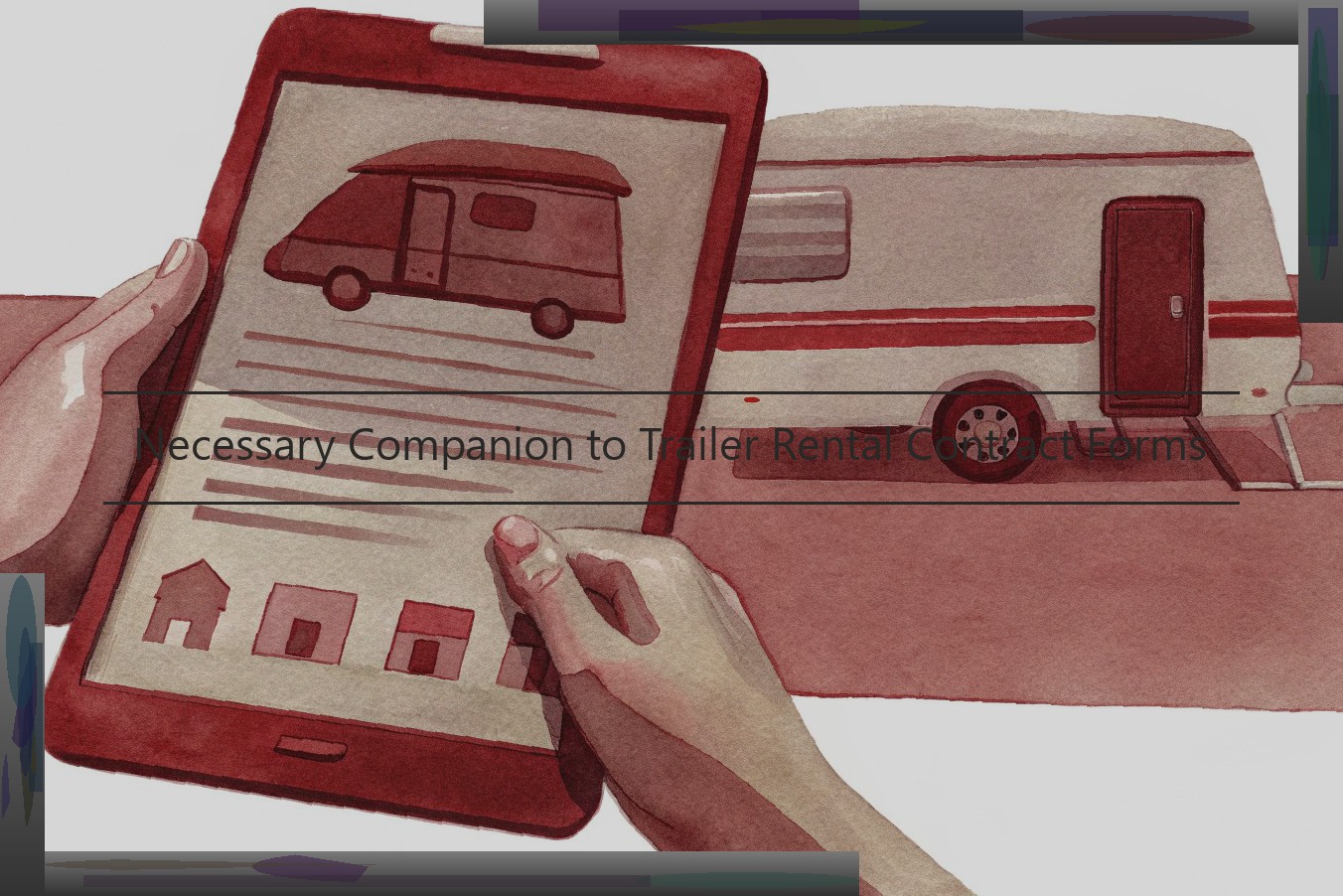Necessary Companion to Trailer Rental Contract Forms
What You Need to Know About Trailer Rental Contract Forms
When you rent a trailer, the contract you sign will ensure the terms of service between you and the trailer rental company. Whether you’re hiring a trailer for a weekend or you’re planning on keeping it for several years, it’s essential to understand the contract terms. Otherwise, you risk having to pay more than expected or facing additional fees down the road. One of the most important elements of trailer rental contracts is the rental fees. Some companies ask for a deposit ahead of time, while others may charge a processing fee. You’ll need to understand the fees associated with your contract term before you sign so that you don’t face unexpected charges. Another critical component of these agreements is the due date for rental payments. When you rent a trailer from a company , that business must be able to manage its cash flow. You’ll need to pay the agreed-upon fees on time or your trailer rental could be canceled. If you don’t have the funds to make the payment on time, you may be in danger of losing the trailer until you can make the payment. Understanding your rights and responsibilities as a trailer renter will make the entire experience smoother. Read the contract inside and out so that there are no misunderstandings as you agree to the terms. An experienced attorney can help you if you have any questions about your contract terms with a rental business.

Basic Components of Trailer Rental Contract Form
Not all rental agreements are the same, and that is precisely what confuses so many people who enter into them. In terms of establishing a comprehensive trailer rental contract form, most rental contract forms should contain specific information about the trailer and person renting it. There are some elements that should be included in a trailer rental contract regardless of what type of trailer you are looking to rent. In this regard, be sure the contract form contains the following:
· All of your personal details – including your full name, telephone number, current address, insurance carriers name, policy number and coverage amounts
· A full description of the trailer being rented, including its VIN, any damage to the trailer prior to the rental and any options or upgrades on the trailer that may raise the total contract price
· The dates for the rental period – including the same times for the drop-off as well as the time for the pickup at the location
· The payment terms – including how much will be paid on a weekly, monthly, bi-monthly or yearly schedule as well as penalties for late payments or requests for damages
· What types of changes are permissible regarding the risk the person renting assumes in the contract
· A section detailing the liability clause here – including the requirements to purchase liability coverage, the time in which you have to purchase the coverage, and the scope of coverage
Be sure to consult several example rental agreement contracts that are provided by the trailer company to fit your purposes. You will always want to have a trailer rental contract that is more extensive than a car rental contracts as a trailer can be much more damaging to your vehicle or home than an ordinary car.
Requirements of a Rental Agreement
Both parties to a trailer rental contract have legal obligations. The following is a list of some of the common legal terms and what they say:
Payment – Both parties agree that anytime after signing the rental contract, the company has the right to process any amount needed to cover charges due and if the credit card payment information is not advised, the company has the right to bill the renter for all amounts due and the renter agrees to pay all charges due under the rental agreement.
Use – The contract may state that all use must be in accordance with applicable laws and ordinances or regulations of public authorities. This protects the company and ensures that the company can hold the renter to the contract. The contract may also state that the company has the right to inspect the rented product at any time upon request. This protects the company as it gives them the ability to ensure their product is being used properly.
Liability – All companies’ liability for physical damage, loss or theft of the trailer may be limited to $3,000 even while the trailer is being used for household, family or personal purposes, by state law including in New York. The renter further agrees to hold the company harmless from any liability, loss of charges, costs and expenses if the trailer is unfit or unmerchantable for any reason or contains latent defects except for those that are known to the renter.
Damage/Insurance – Under the agreement, the renter’s insurance will compensate for the damage done to the product. Or, the company may offer the renter to "acquire and pay" for the products insurance for an additional charge so that no matter what, the company should be able to recover their product.
Personalizing Your Own Trailer Rental Agreement
Once the decision has been made to rent a trailer, the next step is to have your attorney create a trailer rental contract form that fits your particular situation. While many people believe that a trailer rental contract form is purely a matter of local law and custom, this is not the case. Even if your rental agreement is governed by local law, a trailer rental contract form can be written with an eye toward prevailing national practices, which may be more favorable to a landlord or a tenant than local rules. In addition, the clauses in trailer rental contract forms can differ greatly from one rental situation to another (say, for example, if you were renting a house or an apartment instead) , and your attorney can customize your trailer rental contract form accordingly.
Some clauses that can be adapted from other trailer rental situation, or customized for your particular needs include:
• A clause relating to security deposits can be adapted from a residential lease to allow for payment of the security deposit as part of the ongoing rent.
• A clause stating that the trailer tenant will return the trailer in "good and rentable" condition can be modified to allow for you to decide if the trailer is good and rentable upon inspection when the tenant returns it to you at the end of the rental period.
• A clause providing for charging tenants for cleaning, also adapted from residential leases.
Typical Pitfalls and Their Solutions
When drafting or enforcing a trailer rental contract form, it is important to make sure you don’t make any common mistakes. For example, many people forget to spell out any limitations or restrictions for use. This is crucial because it can be used to help invalidate the contract later if someone goes against the terms. Alternatively, you may be too restrictive in your limitations which can keep away potential customers and hurt your bottom line. Finding the right balance is essential.
Another common mistake in trailer rental agreements is that they may be signed by individuals who are technically underage. Having a vehicle owner who is underage can put your business at risk. Likewise, you also don’t want to rent to someone whose skills, maturity and judgment you suspect aren’t up to the needed standards.
Some trailer rental contracts are not enforceable because their provisions are not clearly laid out in a reasonable way. For example, if you have a provision that states something like this: "Any fees will increase by 300% if it rains." That is an unreasonable provision and you will not be able to collect on it, no matter how serious the rain was. All of the provisions and obligations should be presented clearly while remaining reasonable to enforce it.
Furthermore, one of the most common mistakes in trailer rental contracts is someone neglecting to have a provision that indicates oversight over the trailer immediately. If your employee were to let someone borrow an additional trailer to the one listed in the rental agreement, but the additional trailer involved some damage, you could be liable for any damage that occurred, even if you weren’t there for the additional rental. In order to avoid this, a provision should be added to make it clear that the owner is not responsible for any rentals that are not overseen directly by the renter.
Electronic Vs Hard Copy Contract Forms
The trade-offs between digital and paper contract forms are pretty clear-cut: Paper contracts are easily accessible, familiar and provide a means of immediate record-keeping Digital contracts, by comparison, are more hands-off and naturally environmentally friendly There are also some other things of note about digital contract forms for trailer rentals: They have court-admissible verification measures built-in and leaving less room for fraudulent behavior than paper contracts Digital forms are legally accepted in all 50 states except for Montana and California, even if you’re renting locally from a private party, so you don’t need a second lease to tell insurance companies and motor vehicle registries about a new trailer in your collection When you rent using digital contracts, you won’t have to worry about the two to six week timeframe to receive a fully-processed physical contract; you’ll receive a contract in seconds So, paper contracts or digital agreements? Regardless of your preference, we recommend you keep them somewhere safe (digitally or physically) once they’re completed .



